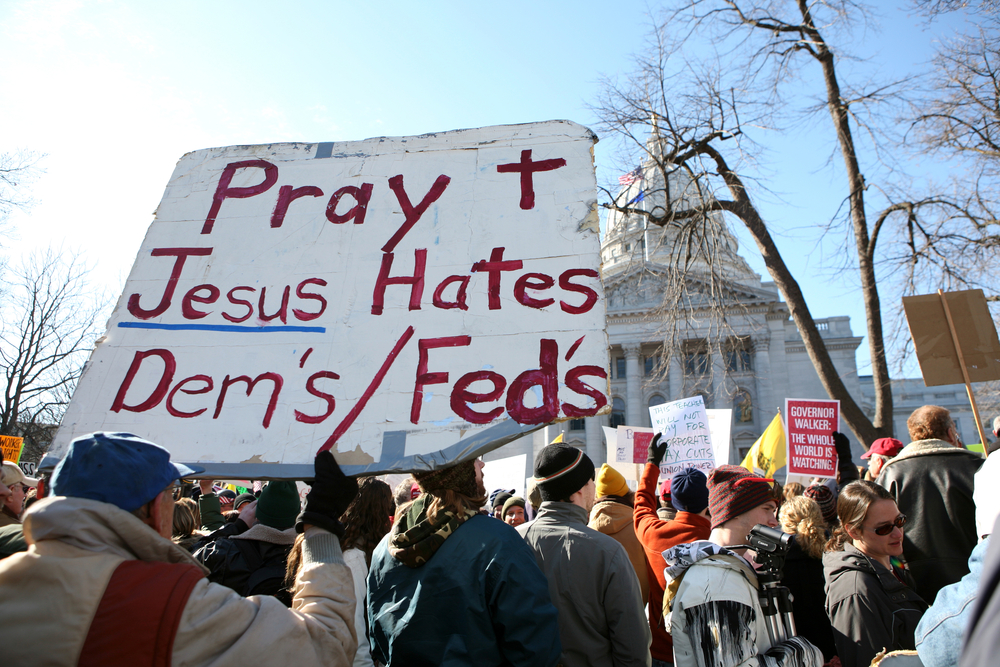Our current political reshuffling has been dizzying, perhaps even more in the Christian community than among Americans in general. The conservative shift toward populism under Trump empowered both a push for real nationalism—blood, soil, industrial policy—as well as even more fringe movements such as the medieval romanticism of the Catholic integralists. Major congressional figures and conservative pundits now actively embrace the title of Christian Nationalist, a fact that was inconceivable just two years ago. At the same time, the left has also splintered between mere progressives and the more aggressive democratic socialism of Bernie and the Squad. In rightly critiquing the church’s complicity in racism, sexism, and cruelty to same-sex-attracted people, some evangelical public intellectuals have simply embraced far-left cultural alternatives. Many far-sighted progressives, however, have become deeply suspicious of how the identity politics of the left could undermine the whole liberal project, and ironically these center-left voters are far more likely to be members of minority populations themselves (currently, one gets whiter and richer the further left one goes). With the general psychological upheaval caused by Trump and the social media storm that constantly surrounds him like the cloud of Pigpen’s dust, the exhausted majority of Americans are left reeling, hardly knowing how to navigate this new world of pronouns, conspiracies, and the politicization of everything.
So it might seem only to add to the exhaustion were I to suggest reading Patrick Schreiner’s new book Political Gospel: Public Witness in a Politically Crazy World. Schreiner argues, à la N.T. Wright, that the term “gospel” is fundamentally political; after all, it was the good news of victory in battle from which the term sprung. Furthermore, Jesus himself talked constantly about a kingdom of some sort, and Schreiner argues that when Jesus tells us to repent and believe, the phrase means something like declaring allegiance. While these are deeply political terms and images, Schreiner’s concept of a political gospel is deeply refreshing to the world-weary soul, because of course Jesus’ kingdom won’t operate in the way earthly kingdoms do.
When we say Jesus is a different kind of king, though, we don’t mean that his kingdom is purely spiritual. My father, a well-meaning and jokey dispensationalist minister, used to say he wanted his epitaph to read “I’m outta here.” Amusing enough (we didn’t actually indulge this particular request) but also indicative of the way that some strands of American Christianity have created a false dualism between the spiritual and the material. The new heavens and the new earth will be right here, and insofar as His kingdom is already-and-not-yet, we might simply quote John Ortberg’s clever book title: Eternity Is Now in Session. So if Jesus’ kingdom isn’t otherworldly in the sense of being purely spiritual or very far away in time and space, what did he mean when he said that it is “not of this world”? He meant that its politics are upside down to the world’s politics, operating through weakness instead of might; bringing life through death; and changing the world through love rather than violence. Jesus is a king like you’ve never seen before.
There’s something deeply freeing about this point, and Schreiner makes a concise but careful case for the accuracy of his biblical interpretation. Working his way through our political past, present, and future, he explores the twin concepts of political submission and subversion. The Bible clearly includes both, with the ultimate (apparent) paradox between Romans 13—“submit to the governing authorities … instituted by God”—and the Book of Revelation, which clearly depicts earthly authorities as satanic and earthly kingdoms as crushed by the true King, Jesus himself. The paradox can only be resolved by noting that earthly authority can further the common good by providing some justice but often oversteps its bounds by defying the natural law. While Schreiner is careful that his book is seen to provide only a framework and not a practical guide, he does borrow from others working on political theology in his claim that any Christian must work for reform against any and all laws that favor some groups over others in ways that are legally irrelevant, such as crony tax laws. We should also critique companies that mistreat their workers, states that redefine sexuality, political corruption wherever it arises, philosophies that denigrate certain groups of human persons, and ministers who exploit or mislead those they claim to serve.
The witness of the Christian tradition against abuses of the state is the constant reminder that the state actually relies on God for its authority, which means its actions are limited by the objective reality of good and evil. At the same time, Schreiner emphasizes that Paul’s description of a Christian’s behavior in the world will look almost mundane: living a quiet life, serving one another, and working for the good of those around her. His point isn’t that Christians won’t upset the state. They obviously did and still do. It’s that admirable Christian practice involves upsetting the state for what one is doing right, not for anything wrong. This is supported by the stories of Jesus, Paul, and others, who in spite of being terribly persecuted and even killed by the state were actually found innocent of any wrongdoing.
Navigating our dual citizenship as temporary members of a nation but eternal members of God’s kingdom can be tricky. Schreiner is right to set aside most policy specifics, since reasonable Christians can disagree on the social science or other questions of prudential judgment. But by the end of the book, one gets a strong sense of the kind of political discipleship he’s envisioning. The problem isn’t that Christians haven’t been political enough; it’s that they’ve been political in the wrong way. By capitulating to the imperial claims of partisan politics, we have become obsessed and even made ill by a utopian belief that everything hangs on the next political event. By refocusing our politics on the kingship of Jesus, we can see that the lives we live in our Christian communities are ultimately the stronger political statement.
For instance, in Black Liberation Through the Marketplace, my coauthor Marcus Witcher and I discuss the famous conservative critique of the welfare state: that the perverse incentives of the system undermine family structure and do far more harm than good. While we agree with this critique, we were also struck by the fact that progressives often paint this argument as a victim-blaming talking point. Using our moral imaginations, however, we can picture a world in which conservative men, deeply moved by the family-structure breakdown in our inner cities, mobilize to mentor fathers or fatherless children, drive children to visit their fathers in prison, or better yet, work with their fathers to get stable jobs upon leaving prison to rejoin their families. How much more credible would their critique of the welfare state and family-structure issues be if their lives reflected real direct caring? They could be deeply disruptive of the state’s takeover of the impoverished family but through the “way of the dove” rather than politics as usual. This is the real Christian subversion.
In the end, Schreiner recommends the way of Jeremiah over the mistakes of Judas, Jonah, and Jeroboam. The Christian answer is not to compromise, retreat, or try to build the kingdom ourselves. Rather, we “set our minds on things above” by centering our politics on the kingship of Jesus. Jeremiah issues warnings to his own people but also to Babylon, and both may be appropriate for a Christian. But Jeremiah also tells Israel to seek the good of Babylon as well as to hope in God’s kingdom. The kingdoms of this earth will exist as the kingdom of God progresses … for a time. Ultimately, however, these powers and the deep evil they consistently perpetrate will be utterly crushed under the feet of the one, true king. So we can do our best as citizens and neighbors even though our core identity is in a greater kingdom altogether. By focusing on obedience to God, we reconcile submission and subversion. We submit to the state in all those cases that are compatible with our submission to God. And even in our subversion, the revolution will often (though not always) consist of the radical lives of love we lead rather than slogans, marches, or riots. But we are ready to die rather than disobey God for the state, and the fact that we do not “love our lives even unto death” is our strength in the upside-down sense. With no fear of what the “principalities and powers” can do to us, we cannot be shaken.
The conflicts emerging in our current shifting and polarizing political moment have demonstrated a deep weakness in many evangelical circles: a lack of political discipleship. We have allowed ourselves to be politically discipled by the news rather than by the Word of God. Political Gospel is an excellent place to begin recovering ourselves, and the time could not be more ripe, with COVID, Trump, racial reckoning, and sexual and gender questions sending our churches into a tailspin. Schreiner helps us to understand how the way of Christ must renew our minds on this topic—not by telling us which side to pick, but by allowing King Jesus to utterly reorder the fundamental categories of our political thinking.

